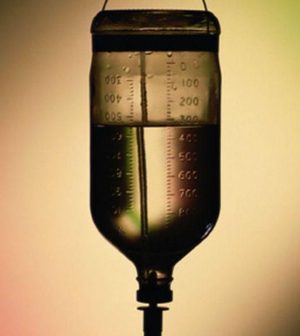- Recognizing the Signs of Hypothyroidism
- 10 Strategies to Overcome Insomnia
- Could Artificial Sweeteners Be Aging the Brain Faster?
- Techniques for Soothing Your Nervous System
- Does the Water in Your House Smell Funny? Here’s Why
- Can a Daily Dose of Apple Cider Vinegar Actually Aid Weight Loss?
- 6 Health Beverages That Can Actually Spike Your Blood Sugar
- Treatment Options for Social Anxiety Disorder
- Understanding the Connection Between Anxiety and Depression
- How Daily Prunes Can Influence Cholesterol and Inflammation
Regeneron Drug Approved to Help Prevent Severe COVID in Vulnerable After Exposure

A preventive monoclonal antibody injection for people at high risk for developing severe COVID-19 after exposure to the coronavirus has been approved by the U.S. Food and Drug Administration.
The first dose of Regeneron’s cocktail must be injected within 96 hours of exposure to the coronavirus, the FDA said in a statement.
It contains the monoclonal antibodies casirivimab and imdevimab and is the first injectable coronavirus antibody treatment approved by the FDA to prevent COVID-19 after exposure to the virus, NBC News reported.
However, the treatment should not be considered a substitute for vaccination and anyone who is eligible should get vaccinated, the FDA added in its approval.
Even after being fully vaccinated, people with weakened immune systems — including those with autoimmune diseases, HIV patients, cancer patients and organ transplant recipients — may still be vulnerable to COVID-19.
About 3% of the U.S. population is immunocompromised.
Monoclonal antibodies protect against severe COVID-19 illness by going after the coronavirus infection while it’s still mostly in the nose and throat, explained Dr. Myron Cohen, a coronavirus antibody researcher at the University of North Carolina at Chapel Hill.
“It’s a race between your ability to make an antibody to protect your lungs and the rest of your body and the virus,” he told NBC News. “And if you’re likely to lose the race, you’re the person for whom these antibody drugs are appropriate.”
Cohen was one of the investigators behind the study of the Regeneron treatment as prevention.
“It’s good to know that for people who do not respond well to vaccines, including those who do not make antibodies, we can now help protect them against getting infected with SARS-CoV-2 by giving them antibodies following exposure,” Dr. Ghady Haidar, a transplant infectious diseases physician at the University of Pittsburgh Medical Center, told NBC News.
More information
Visit the U.S. Department of Health and Human Services for more on COVID antibody treatments.
Source: HealthDay
Copyright © 2026 HealthDay. All rights reserved.










